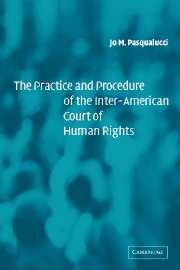Book contents
- Frontmatter
- Contents
- Foreword
- Preface
- Acknowledgments
- Table of cases
- Table of Articles of the American Convention on Human Rights
- Table of 2001 Rules of Procedure of the Inter-American Court on Human Rights
- Table of 2001 Rules of Procedure of the Inter-American Commission on Human Rights
- Table of other legal instruments and documents
- 1 Introduction
- PART I The advisory jurisdiction of the Inter-American Court
- PART II The contentious jurisdiction of the Inter-American Court of Human Rights
- PART III Provisional measures
- Appendix 1 American Convention on Human Rights
- Appendix 2 Rules of Procedure of the Inter-American Court of Human Rights
- Appendix 3 Statute of the Inter-American Court of Human Rights
- Appendix 4 Rules of Procedure of the Inter-American Commission on Human Rights
- Appendix 5 Form for presenting petitions on human rights violations
- Bibliography
- Index
Appendix 2 - Rules of Procedure of the Inter-American Court of Human Rights
Published online by Cambridge University Press: 28 July 2009
- Frontmatter
- Contents
- Foreword
- Preface
- Acknowledgments
- Table of cases
- Table of Articles of the American Convention on Human Rights
- Table of 2001 Rules of Procedure of the Inter-American Court on Human Rights
- Table of 2001 Rules of Procedure of the Inter-American Commission on Human Rights
- Table of other legal instruments and documents
- 1 Introduction
- PART I The advisory jurisdiction of the Inter-American Court
- PART II The contentious jurisdiction of the Inter-American Court of Human Rights
- PART III Provisional measures
- Appendix 1 American Convention on Human Rights
- Appendix 2 Rules of Procedure of the Inter-American Court of Human Rights
- Appendix 3 Statute of the Inter-American Court of Human Rights
- Appendix 4 Rules of Procedure of the Inter-American Commission on Human Rights
- Appendix 5 Form for presenting petitions on human rights violations
- Bibliography
- Index
Summary
Approved by the Court at its forty-ninth regular session, 16–25 November 2000
PRELIMINARY PROVISIONS
Article 1
Purpose
These Rules regulate the organization and establish the procedure of the Inter-American Court of Human Rights.
The Court may adopt such other Rules as may be necessary to carry out its functions.
In the absence of a provision in these Rules or in case of doubt as to their interpretation, the Court shall decide.
Article 2
Definitions
For the purposes of these Rules:
the term ‘Agent’ refers to the person designated by a State to represent it before the Inter-American Court of Human Rights;
the term ‘Deputy Agent’ refers to the person designated by a State to assist the Agent in the discharge of his duties and to replace him during his temporary absences;
the expression ‘General Assembly’ refers to the General Assembly of the Organization of American States;
the term ‘Commission’ refers to the Inter-American Commission on Human Rights;
the expression ‘Permanent Commission’ refers to the Permanent Commission of the Inter-American Court of Human Rights;
the expression ‘Permanent Council’ refers to the Permanent Council of the Organization of American States;
the term ‘Convention’ refers to the American Convention on Human Rights (‘Pact of San José’, Costa Rica);
the term ‘Court’ refers to the Inter-American Court of Human Rights;
the term ‘Delegates’ refers to the persons designated by the Commission to represent it before the Court;
the expression ‘original claimant’ refers to the person, group of persons, or nongovernmental entity that instituted the original petition before the Commission, pursuant to Article 44 of the Convention;
the term ‘day’ shall be understood to be a natural day;
the expression ‘States Parties’ refers to the States that have ratified or adhered to the Convention;
[…]
- Type
- Chapter
- Information
- Publisher: Cambridge University PressPrint publication year: 2003



